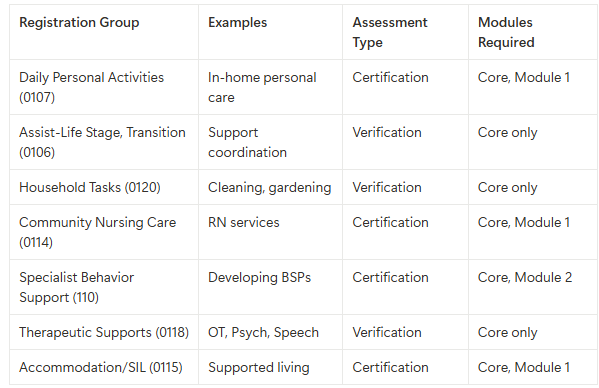Registering as an NDIS provider isn’t a one-size-fits-all process. Instead, the NDIS uses a modular registration system, where providers register for specific registration groups based on the services they intend to deliver. Each group has its own compliance requirements, risks, and assessment criteria, and it’s critical to understand them before applying.
In this guide, we’ll break down:
Whether you’re new to the NDIS or reassessing your business scope, this guide will help you navigate registration with clarity and confidence.
🔍 What Are NDIS Registration Groups?
NDIS registration groups (often referred to as “registration classes” or “modules”) categorise the different types of supports and services a provider can deliver under the scheme. There are over 30+ registration groups, but they fall under broader categories based on:
Registration groups also determine what NDIS Practice Standards a provider must comply with and whether they are subject to verification or certification audits.
🧩 The Four Key Modules of NDIS Registration
The NDIS Commission outlines four key modules that providers may need to comply with depending on the registration group(s) they choose:
1. Core Module (Required for All Registered Providers)
This module is the foundation. It applies to every registered provider, regardless of services delivered.
🔹 Covers:
📌 Real-World Example: A sole trader delivering community participation support must still comply with the Core Module, including having a complaints process and risk management practices.
2. Supplementary Module 1: High-Intensity Daily Personal Activities
Applies to providers delivering complex or intensive personal care such as:
🔹 Additional Requirements:
🩺 Example: A provider supporting participants with tracheostomies or PEG feeding will need this module and certification under relevant NDIS Practice Standards.
3. Supplementary Module 2: Specialist Behaviour Support
Required if your service includes:
🔹 Additional Requirements:
🔍 Note: This module is legally significant. The NDIS Commission monitors restrictive practices closely.
4. Supplementary Module 3: Implementing Behaviour Support Plans
Applies if your service involves applying behaviour support plans developed by someone else. You don’t need to write the plans, but you:
📘 Tip: Providers who implement BSPs without holding this module are non-compliant. Even day programs and support workers may need it if they help manage behaviours of concern.
🧾 Examples of Common NDIS Registration Groups and Their Requirements
Here’s a quick overview of some of the most common NDIS registration groups and which modules they align with:

🛠️ Verification vs Certification: What's the Difference?
📋 Assist Providers Tip: Even if you only provide low-risk supports, registering under the wrong group may trigger a certification audit. Know before you apply.
⚠️ Common Mistakes Providers Make
🔄 Should You Register for Multiple Groups?
Yes, if you genuinely intend to deliver multiple types of services.
🧠 Strategy: Focus your registration on your core business offering. You can expand later via a variation of registration once your systems are mature.
✅ Key Takeaways
💼 Call to Action:
Confused about which NDIS modules you need?
Let Assist Providers guide you through the registration maze.
✅ Minimise audit stress
✅ Maximise your chances of approval
📲 Contact us today for expert NDIS registration support.
We’ll build one for you so you can focus more on doing what you love in your business.
Book a callWork with our expert funnel strategists, media buyers, copywriters, creative strategists, and sales consultants, to
Gone are the days of managing teams of freelancers and spending countless hours learning how to do what we do best.
book a call